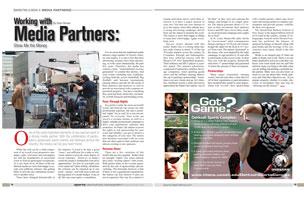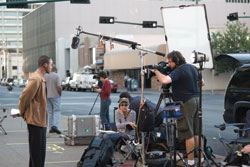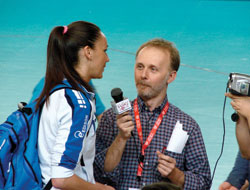
One of the most important elements of any special event is a strong media partner. With the proliferation of participatory grassroots sports events and festivals across the country, the media can be your best friend.
While the web can be a solid component of an overall event promotion campaign, radio, television and newspapers are still the foundations of successful event or festival participant recruitment. At a very basic level, all three of the traditional media are more than happy to accept your publicity releases, but getting them to provide any substantial promotion is another story.
 Times have changed dramatically in the industry. It used to be that a good "cause" was sufficient for a radio or television station to provide some degree of on-air exposure. However, in today's world the media is bombarded with press opportunities. So, how do you make your event stand out? Quite frankly, oftentimes the solution can be summed up in one word – money! And with most events not having much of a media budget, if any at all, this can cause quite a conundrum.
Times have changed dramatically in the industry. It used to be that a good "cause" was sufficient for a radio or television station to provide some degree of on-air exposure. However, in today's world the media is bombarded with press opportunities. So, how do you make your event stand out? Quite frankly, oftentimes the solution can be summed up in one word – money! And with most events not having much of a media budget, if any at all, this can cause quite a conundrum.
It is no secret that while the traditional media attracts a large number of viewers, listeners and readers. It is also a fact that their advertising revenues have been decreasing, in some cases dramatically, the past few years. Therefore, the media has coined a term, "nontraditional revenue generation" to combat this decline. And your events, including runs, triathlons, cycling, festivals, soccer, basketball, flag football, and lacrosse tournaments (among others), provide for the needs of their audience and sponsors as well as provide an association with a popular experiential property. You have something they need and from which they can benefit, in both financial and branding terms.
Pass-Through Rights
In a perfect world, the most successful events and festivals can secure not only promotional exposure, but also a potential "rights" fee as well. It's a win-win situation for everyone. Your event can receive a revenue stream, as well as a highly valuable promotional campaign to drive your registration, audience and awareness. In return, the station receives the rights to sell sponsorship for your event and (ideally), you ghetto protect a few categories of your own. The station also becomes associated with an event that sets them apart to their audience and attracts existing or new sponsors.
Revenue Share
There are a few variations of this model that are also popular. Rather than an outright "rights" fee, some stations have done "revenue shares" with events. Both parties share in the revenue generated by the sale of sponsorships and advertising. The downside however, is that if there is not a guaranteed commitment, the station can lose interest if sales are not as expected. One way for a station to remain motivated, and to catch their attention, is to have a major sponsor of your own. You then ask your sponsor to go to the station, where they already have a strong advertising campaign, and let them ask the station to promote the event. The station is more than happy to oblige to keep their client happy. Again, everybody wins.
Success stories abound with this model. Radio One is a strong urban hip-hop radio format in about 15 of the top 50 media markets across the country. In Columbus, Raleigh and Indianapolis, they have achieved success with the Hoop-it-UP 3on3 Basketball property. Their audience and HIU's players is a perfect match. The station's advertisers, comprised of automotive retailers, beverage companies, retail sporting goods stores and the military (among others), line-up to purchase sponsorships. Sometimes even new clients step up. In Columbus, Starbucks (rarely a radio advertiser) approached the Radio One station "out of the blue" as they were just entering the market, and bought in as a major sponsor. The station generates about a 3:1 return on their investment, their audience loves it and HIU has a two to three week, on-air promotional campaign and a rights fee to boot!
In St. Louis, Bonneville radio, led by its "soccer-mom" adult contemporary format catering to 25-54 year old women, bought the rights for the Kick-It 3v3 Soccer Tour event. The station "promoted" to the moms, who were inspired by the radio campaign, to sign up their 6-14 year-olds to participate in the soccer event. In their first year with the property, Bonneville sold some 17 sponsorships and generated 10 times the amount of their investment.
Partnerships
Many major community running events, festivals and other events that live off of their registration or paid attendance have modified this model to some degree. Some will "co-sell" their sponsorship with a media partner; others may invest some advertising dollars to enhance participation and provide greater visibility for their own sponsors.
 The QuickChek Balloon Festival in New Jersey is the largest balloon festival of its kind in the country, outside of Albuquerque. Festival owner Howard Freeman has perfected the balance of sponsors he brings on himself, along with paid media and the leverage of his convenience store chain, which is the title sponsor.
The QuickChek Balloon Festival in New Jersey is the largest balloon festival of its kind in the country, outside of Albuquerque. Festival owner Howard Freeman has perfected the balance of sponsors he brings on himself, along with paid media and the leverage of his convenience store chain, which is the title sponsor.
Media is an integral part of what can make or break your event. There is no one better qualified to sell your event than you. Know your event inside and out, and who and how many you bring to the table when you are selling and pitching a potential media partner. Make sure you also know as much as you can about their world, audience and what their objectives are. If you prepare properly, whether it is radio, television or newspaper, they just may be "showing you the money!"
Open a newspaper, or turn on the radio or TV at any point in time and you're bound to find an article or hear a story about a dog being rescued and adopted by a loving family. It's true..."a dog is man's best friend."
When it comes to event planning, a similar adage may be heard – "the media can be an event planner's best friend." In order for you, as an event planner, to be "heard" by the media you must totally understand your responsibilities in order to communicate effectively and be taken seriously.
It is also important to understand that the editorial side of the media is charged with the responsibility of providing informational content. They decide what is newsworthy and what is interesting. What will keep the attention of the readers and the listeners? If you want editorial (free) coverage of your event, it must be presented in a way that makes sense for their audience.
Whether the sports event is a community tournament or a national competition, event organizers must approach the media in a professional and competent manner. An amateurish approach can make a poor impression on the media and seriously damage a sports event's overall marketing plan and coverage of the event itself. Because pre-event media coverage provides the public with a strong first impression, the event planner must be sure all information provided is clear, accurate and appropriate.
Also, remember that time and space are limited – time allocated to any story is determined by the editor and their perception of the event's importance to the readers or viewers. While being professional, convey the importance of the event with every media contact. Drama and importance must be inherent, but give information that is compelling enough on its own and doesn't need false hype. Always maintain frankness and credibility.
Once you have finalized an agreement with the media,your responsibilities do not end. Remember, the media is simply providing a platform in which to promote your event. It is up to you to provide the necessary information to be covered:
Provide compelling story ideas (i.e., touching stories about some of the participating athletes, interesting points concerning past athletes, outlook for business stories [economic benefits])
Accurate information to help support their reporting (i.e., press releases, background information, event history, official rules and format of competition, official statistics, schedule of events, single point of contact for additional information)
Good photo or video opportunities which adds visual support to their words (i.e., access to event organizer management, coaches and athletes for pre-and post-event press conferences and interviews)
Facilities to help them cover the event (i.e., appropriate and comfortable working conditions; timely access to official and accurate statistics, score sheets, athlete background information; workstations with clear view of play; clear, unobstructed positions for photographers; availability of power, phone lines, data lines and fax machines).
Event planners need the media to help publicize the event from the moment it is introduced, throughout the planning process, and after the day of the event. Keep them happy and they'll keep you happy!

